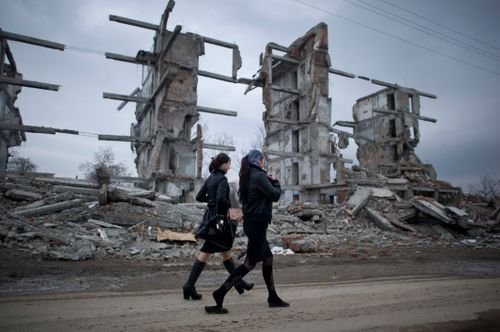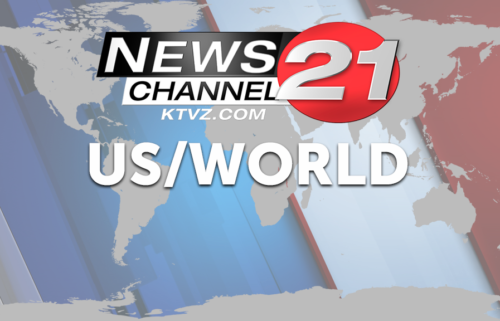Chechnya Fast Facts

Here’s a look at Chechnya, a republic in southwestern Russia, in the Caucasus Mountains region. Chechnya is bordered by Russia, the country of Georgia, and the Russian republics of Dagestan and Ingushetia.
Facts
Capital: Grozny
Population: 1,465,791 (January 2019 est.)
President: Ramzan Kadyrov (2007-present)
Timeline
1991 – Chechnya begins fighting for independence from the crumbling Soviet Union.
1994 – The Russian Federation sends 35,000-40,000 troops to Chechnya to stop the rebellion.
February 1995 – Grozny falls to Russian forces.
May 27, 1996 – A ceasefire is declared, but fighting continues. Chechen rebels seize key government sites.
August 31, 1996 – A peace accord is signed and Russian troops soon withdraw. Two years of fighting leaves 120,000 Chechens and 3,000 Russian troops dead.
August 1999 – Islamist rebels launch incursions into neighboring Dagestan. Russian forces respond by moving into Chechnya in September.
September 1999 – Apartment buildings in Moscow, Buynaksk and Volgodonsk are bombed, resulting in the deaths of nearly 300 people.
February 2000 – Russian forces take control of Grozny, and the conflict begins to wind down.
July 2000 – Militants launch five suicide bomb attacks on Russian security bases. The deadliest attack kills 54 people.
October 2002 – Chechen rebels seize a theater in Moscow, and hold over 700 people hostage. Russian forces use an unknown gas to subdue the militants. All 41 of the rebels and 129 hostages die.
May 2003 – Fifty-nine people are killed when two suicide bombers drive a truck full of explosives into a government complex in northern Chechnya.
June 2003 – A suicide attack kills 16 people at a concert in Moscow.
February 2004 – Forty are killed and 100 injured when a suicide bomber detonates a bomb on a Moscow metro train.
May 2004 – Akhmad Kadyrov, the president of Chechnya, is assassinated. Kadyrov was elected Chechen president with backing from Russia.
August 24, 2004 – Two Russian passenger planes are blown up almost simultaneously, killing 89.
August 31, 2004 – A female suicide bomber kills nine people and herself, and wounds 51 others, when she detonates a bomb outside a subway station in northeastern Moscow.
September 1-5, 2004 – Armed attackers storm a school in Beslan, in southern Russia, and take at least 1,200 people hostage, including children. The hostage takers reportedly demand the release of more than two dozen prisoners and that Russia withdraw all of its forces from Chechnya. Some of the hostage takers are reportedly wearing explosives belts used in suicide bombings.
September 2, 2004 – Some hostages are released.
September 3, 2004 – Russian troops end a standoff at the Beslan school in which Chechen rebels had taken several hundred students, teachers and parents hostage.
September 5, 2004 – The Russian government takes one suspect in custody as the death count stands at least 335 hostages, including 156 children, along with 26 hostage takers and 10 Russian special forces soldiers.
September 17, 2004 – In an email message posted on the Chechen rebel website, Kavkazcenter.com, Chechen terrorist leader Shamil Basayev claims responsibility for several recent terrorist attacks in Russia, including the Moscow metro bombing, explosions aboard two passenger jets and the taking of hostages at a school in Beslan.
July 2006 – Shamil Basayev is killed, but the exact details remain unclear.
November 2006 – Abu-Khavs, described as the commander of all foreign fighters in the North Caucasus, is killed by security forces.
June 2008 – According to UNICEF, since 1994, 700 people have been killed by landmines left over from the Chechnya-Russia Conflict.
April 2009 – Russia declares an end to its 10-year anti-terror operation in Chechnya with the rebel movement largely quashed.
March 29, 2010 – Female suicide bombers detonate explosives in two Moscow subway stations during morning rush hour. Russian officials suggest that Chechen separatists are to blame.
August 28, 2010 – Chechnya announces the deaths of 12 militants and two police officers in a gunfight that saw 30 militants attack the home village of Chechen President Ramzan Kadyrov.
October 19, 2010 – Three heavily armed men attack the parliament building in Grozny. Two police officers and a parliamentary aide are killed, with 17 people injured in the attack.
February 7, 2011 – Chechen rebel leader Doku Umarov claims responsibility for the January 24, 2011 bombing of Moscow’s Domodedovo Airport that killed 36 people.
May 26, 2011 – The United States has added Caucasus Emirate, a Chechen group based in North Caucasus, to its list of terrorist groups.
March 18, 2014 – According to a Chechen jihadist website, rebel leader Doku Umarov has died.
December 4, 2014 – Gunmen described as Islamic militants attack a building in Grozny, killing at least 20 people.
May 2017 – Kadyrov tells Interfax news agency that gay people do not exist. He says “In Chechen society, there is no such thing as nontraditional orientation.”
January 14, 2019 – Russian LGBT Network releases a statement regarding the “new wave of persecution against LGBT in Chechnya.” It is thought that roughly 40 people have been detained and at least two people have died as a result of torture.

